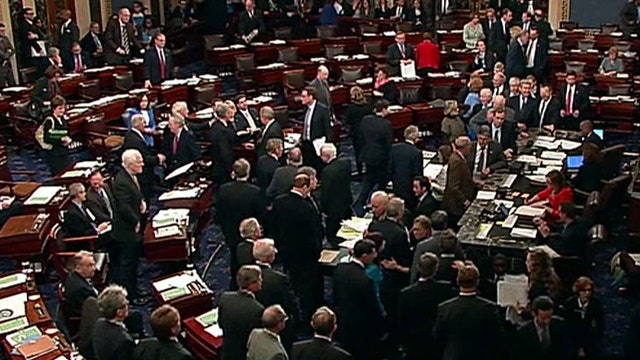Senate Democrats approved their first budget in four years early Saturday morning -- but just barely.
The final vote, which was held after the Senate worked well past midnight churning through dozens of amendments, exposed cracks in Democratic unity as lawmakers facing re-election peeled off, citing the proposal's failure to tackle the deficit. In the end, the budget plan squeaked by on a razor-thin 50-49 vote.
Four Democrats opposed it, and one did not vote.
The defections, while amounting to only a handful, nevertheless could spell trouble for Democratic leaders as they head into the next phase of negotiations with House Republicans. Leaders could be pressured by their more moderate members to make a bigger push to balance the budget, even if they don't want to make the kinds of major changes to entitlements that House Budget Committee Chairman Paul Ryan, R-Wis., prescribes.
Sen. Mark Begich, a moderate Democrat from Alaska, proudly announced Saturday that he opposed the Senate's plan because of its copious red ink.
"While I am happy that Congress is finally talking seriously about our fiscal crisis, this budget didn't go far enough," Begich said. "Alaskans expect us to finish the job and make this staggering deficit manageable. Passing this problem off to our children is not an option."
Though Democrats say Ryan is relying on unrealistic projections and changes, the House Republican budget aims to eliminate deficits over the next 10 years -- on paper, anyway. The Senate Democrats' budget doesn't come close, despite raising taxes by $1 trillion. Under their plan, the deficit over the next decade never dips below $400 billion and would hover at or near $600 billion by 2023.
This, as Republican Sen. Jeff Sessions repeatedly notes, would add $7.3 trillion to the national debt over that period.
"The content of the plan the majority has now approved demonstrates why they were unwilling to reveal it for so long: their proposal, once accurately understood, cannot be publicly defended," Sessions said in a statement.
House Republicans were not without defections of their own. Ten Republicans opposed Ryan's 2014 plan earlier this week. But the Republicans' budget resolution still passed by a more comfortable margin in the House than the Democrats' did in the Senate.
The four Senate Democrats who voted against the Democrats' bill were Kay Hagan, D-N.C.; Max Baucus, D-Mont.; Mark Pryor, D-Ark.; and Begich. But there are more up for re-election in 2014 in moderate-to-conservative states where votes for a deficit-heavy budget plan would cause campaign problems.
President Obama plans to release his own 2014 budget next month, an unveiling that will be studied for whether it signals a willingness to engage Republicans in negotiations or play political hardball.
The Democratic budget's $975 billion in new taxes would be matched by an equal amount of spending reductions coming chiefly from health programs, defense and reduced interest payments as deficits get smaller than previously anticipated. This year's projected deficit of nearly $900 billion would fall to around $700 billion next year and bottom out near $400 billion in 2016 before trending upward again. Shoehorned into the package is $100 billion for public works projects and other programs aimed at creating jobs.
Neither the Democratic nor Republican plan will clear Congress in its current form -- plus each is just a blueprint which by itself does not appropriate money.
Democrats and Republicans will now launch into hard bargaining, and each make sacrifices if they are to settle on a bona fide budget, as opposed to passing stopgap spending bills to fund the government year after year.
The White House on Saturday again reiterated its displeasure with the House Republican plan, which does not call for tax hikes on anybody.
"The House Republican budget refuses to ask for a single dime of deficit reduction from closing tax loopholes for the wealthy and the well-connected but instead makes deep cuts to education and manufacturing while asking seniors and the middle class to pay more," White House Press Secretary Jay Carney said.
He said the Senate plan would "create jobs and cut the deficit in a balanced way." Carney said it is time for Congress "to come together to find common ground."
Begich laid out a series of novel proposals for cutting spending further, including: preventing people making more than $1 million from receiving jobless benefits; allowing senators to give back part of their salary; and cracking down on wasteful spending in the farm subsidy program.
It would take more than that to bring the budget into balance.
The blueprint from Ryan claims $4 trillion more in savings over the period than Senate Democrats by digging deeply into health care and food benefits and other safety net programs. It would also transform the health care program for older Americans into a voucher-like system for future recipients. Many Democrats, who say the sequester has cut too deep as it is, are resisting further cuts to domestic spending as well as the specific changes Ryan wants to make to health care entitlements.
"We have presented very different visions for how our country should work and who it should work for," said Democratic Sen. Patty Murray, who chairs the Senate Budget Committee. "But I am hopeful that we can bridge this divide."
The Associated Press contributed to this report.





